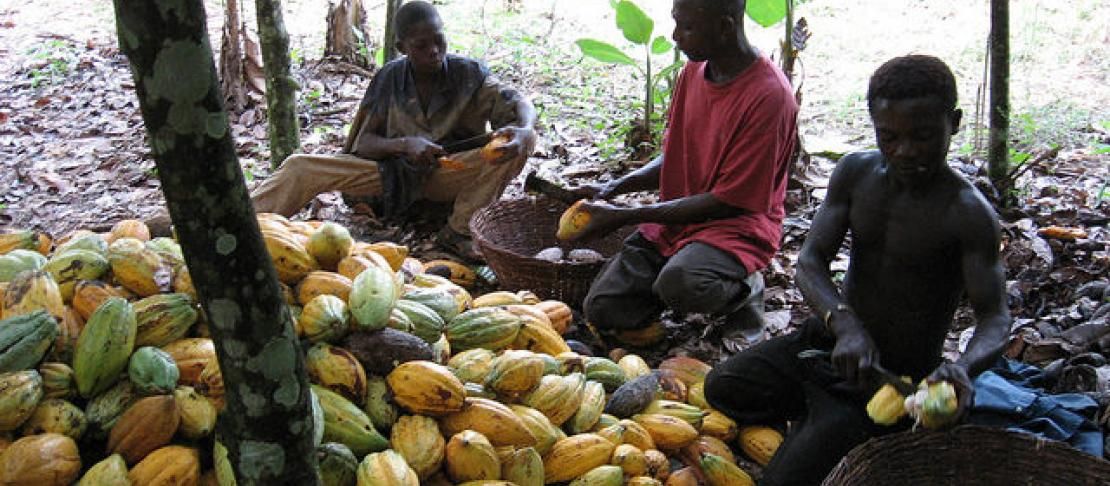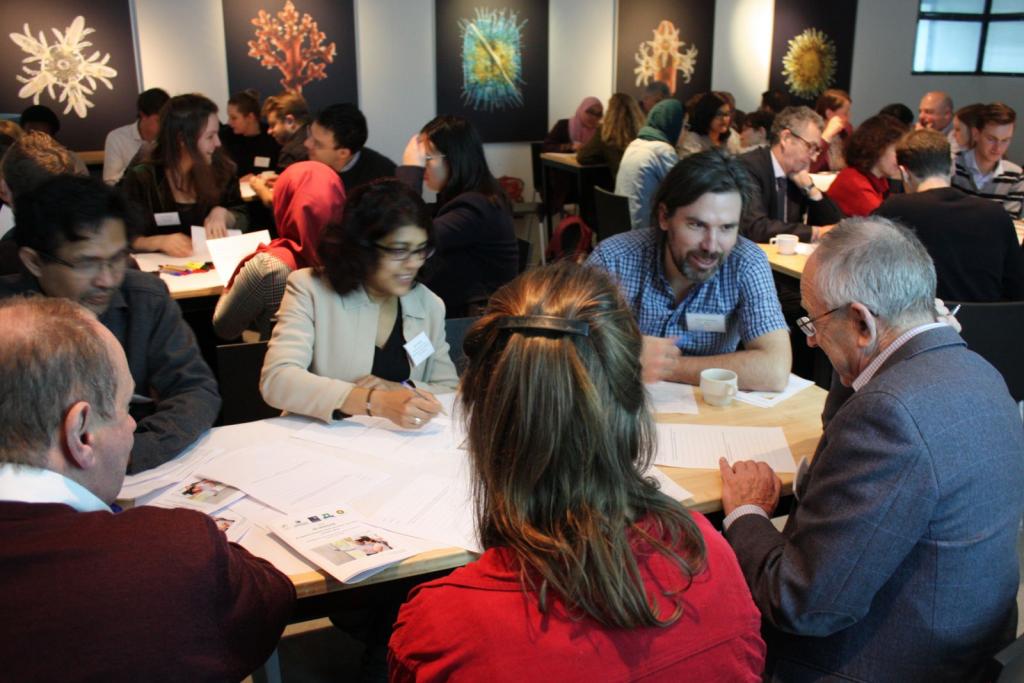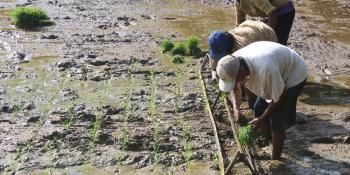RE-IMAGINE project launches in Utrecht

What are the impacts of climate scenarios on political processes and how can we improve them?
On 23 January 2018, the Re-imagining anticipatory climate governance in the world’s vulnerable regions (RE-IMAGINE) project was launched at the Utrecht University Museum in Utrecht, The Netherlands.
RE-IMAGINE investigates ways in which scenario processes that explore the implications of different climate futures can play a role in appropriate and effective modes of anticipatory climate governance in the world’s most vulnerable regions.
Foresight approaches using future scenarios are increasingly seen as urgently needed to understand the implications of future climate change and its interactions with other (political, economic, cultural, environmental) changes worldwide. But we are yet to understand the full extent of the benefits and challenges of scenarios as policy interventions, particularly in the countries most vulnerable to climate change: Whose ideas matter? Who is involved? Who is excluded? Are conversations about climate futures happening at the right time vis-a-vis policy and decision-making? What kinds of methods and scientific approaches are being used to think about what the future may bring? The RE-IMAGINE project seeks to tackle these questions from a critical social science perspective.
RE-IMAGINE acts as a twin project with the existing scenarios project supported by the CGIAR Research Program on Climate Change, Agriculture and Food Security (CCAFS). This existing project has achieved some impressive results in terms of guiding national policies around the world. RE-IMAGINE complements the CCAFS Future Scenarios Project to offer a critical but actionable social science perspective to help better understand the politics of climate foresight.
Made possible by the BNP Paribas Foundation’s 'Climate Action Call', the RE-IMAGINE project is led by Utrecht University’s Copernicus Institute for Sustainable Development with Wageningen University & Research, the University of Oxford and the CCAFS Future Scenarios Project as main project partners, as well as a number of additional partners in four global regions.

A day that brought together researchers, policymakers, the private sector and civil society
The RE-IMAGINE launch event was a great success, with over 50 participants from across the research, private, not-for-profit and policy sectors.
After a warm welcome, the day started off with Karlijn Muiderman introducing the RE-IMAGINE project. Through Karlijn's anecdotes from her personal expertise in anticipatory climate governance, and through subsequent presentations by project leader Joost Vervoort (Utrecht University) and project co-leader Aarti Gupta (Wageningen University & Research), the main outline of the project was drafted: bringing together and bridging the climate foresight and climate governance research communities. Put simply: understanding how foresight processes connect with actual decision-making.
Next, foresight expert Garry Peterson (Stockholm Resilience Centre) discussed the challenges of action-oriented scenarios, after which Phil Macnaghten (Wageningen University & Research) offered an environmental governance perspective on foresight. Peterson highlighted how scenarios are subjected to framing, resulting in specific but possibly limiting narratives if their framing is not carefully considered. With a focus on regionality, he emphasised how the politics of measurements are highly influential. Macnaghten illustrated how climate foresight scenarios are often still disconnected from pragmatic political action. This was followed by a few words from CCAFS Regional Scenarios Coordinator for Latin America, Marieke Veeger, who reflected on her experiences conducting foresight processes on the ground.
Finally, representatives from BNP Paribas offered their perspectives. Daniel Thielemans, CEO of BNP Paribas NL, explained why banks care about climate change, and Jean-Jacques Goron, Managing Director of the BNP Paribas Foundation, went on to tell us how RE-IMAGINE fits in with the foundation's ‘Climate Action Call’, which aims to strengthen the response to and anticipation of climate change not only among its own employees, but among all citizens around the world.
This brought us back to the core aim of the project and the day itself, namely, addressing the disconnect between climate foresight and anticipatory climate governance. To make a start on this and ensure the day was useful and thought-provoking for those present, the RE-IMAGINE team facilitated a workshop that strived to connect communities beyond the theoretical level. In small groups, individuals mapped out their various expertise, along with the challenges and opportunities they faced personally and in their field more generally when planning for climate change. This visualisation was a first step towards finding commonalities, not only between the two research communities—foresight and governance—but also between researchers, private sector actors, policymakers and civil society organizations.
How can we connect #climateforesight and #climategovernance #research ? Learn more with the #RE-IMAGINEforesight team: Dr. Joost Vervoort @UtrechtUni & Dr. Aarti Gupta @WUR & Marieke Veeger pic.twitter.com/40DhV4mQgh
— Fondation BNPParibas (@FondationBNPP), January 23, 2018
The results of the workshop were multifold: from basic work-related insights to valuable future cooperations between the diverse groups of people attending. The organisers will follow up with a blog on the workshop’s main conclusions so that not only the attendees, but also the wider foresight and governance communities, will be able to learn from the day’s proceedings.
What’s next?
Through work led by project researcher Karlijn Muiderman, the RE-IMAGINE team is currently working on the theoretical framework that will drive the next three years of the project. Using this framework, the team will analyse the challenges and opportunities associated with the role of foresight in the governance of climate change in four CCAFS regions: Central America, South Asia, Southeast Asia and West Africa. Based on the results of this analysis, the team and their regional collaborators will develop building blocks that can be used to create fairer and more inclusive scenarios processes. These building blocks will then be tested in the four regions and analysed across regions to see what does and does not work.
Interested in policies and priorities for climate-smart food systems? Subscribe to our newsletter to receive quarterly updates on our CCAFS work and occasional announcements.
Read more:
- Project page: RE-IMAGINE - Re-imagining anticipatory climate governance in the world's vulnerable regions
- Journal article: Vervoort J and Gupta A. 2018. Anticipating climate futures in a 1.5 C era: the link between foresight and governance. Current Opinion in Environmental Sustainability 31: 104-111.
- Journal article: Palazzo A, Vervoort JM, Mason-D’Croz D, Rutting L, Havlík P, Islam S, Bayala J, Valin H, Kadi Kadi HA, Thornton P, Zougmore R. 2017. Linking regional stakeholder scenarios and shared socioeconomic pathways: Quantified West African food and climate futures in a global context. Global Environmental Change 45: 227-242.
- Journal article: Vervoort JM, Bendor R, Kelliher A, Strik O, Helfgott AER. 2015. Scenarios and the art of worldmaking. Futures 74: 62-70.
Charlotte Ballard is the Communications Officer for the RE-IMAGINE project, sister project of the CCAFS Scenarios Project, and is based at Utrecht University in the Netherlands. Sanne Berbé is an MSc student in Environmental Governance at Vrije Unversiteit (VU) Amsterdam in the Netherlands. Joost Vervoort is Project Leader of the CCAFS Scenarios Project and the RE-IMAGINE project. He is also an assistant professor at the Copernicus Institute of Sustainable Development, Utrecht University and an honorary research associate at the Environmental Change Institute (ECI), University of Oxford.



